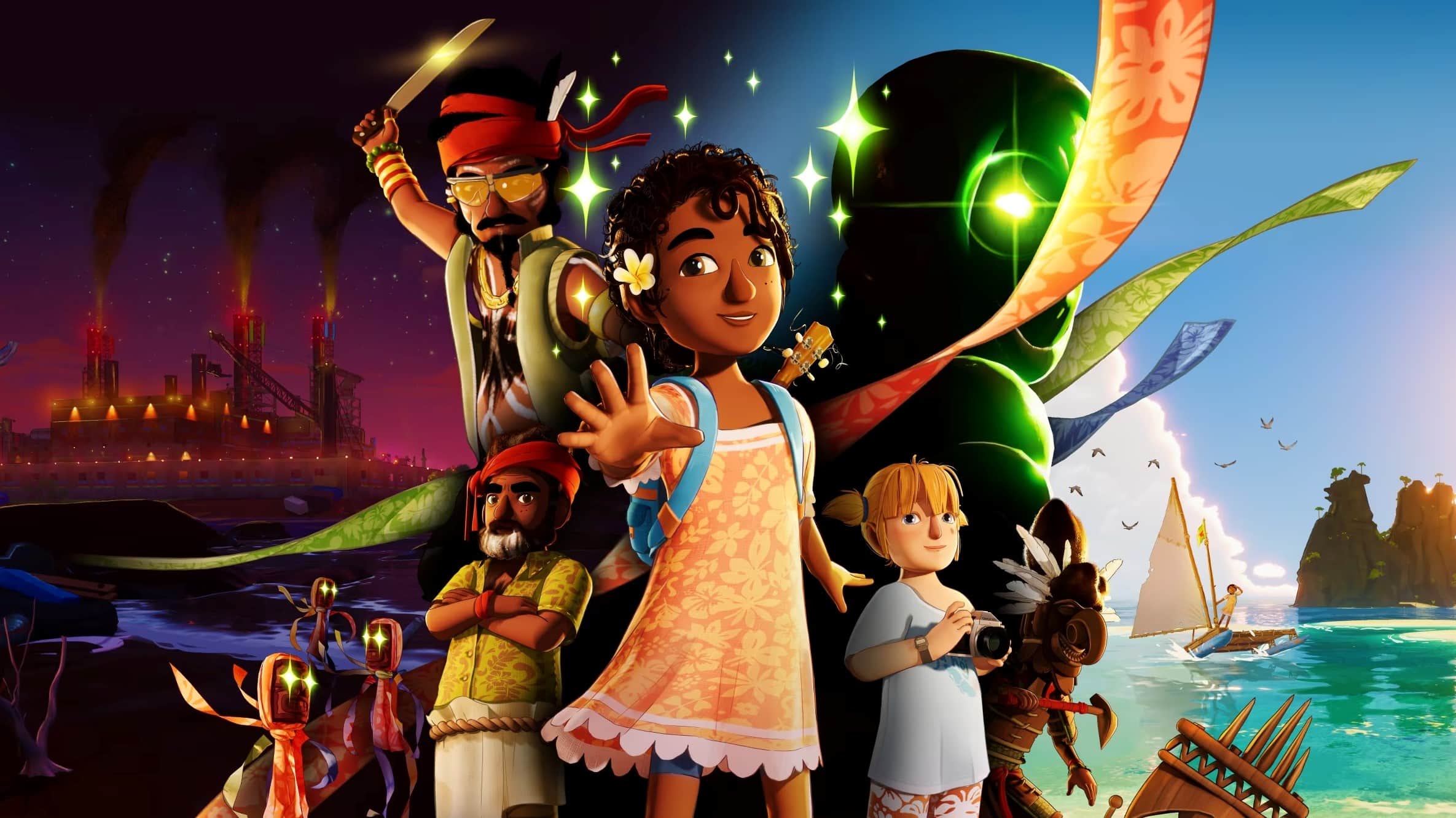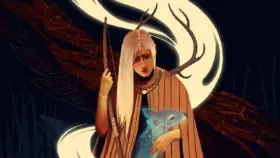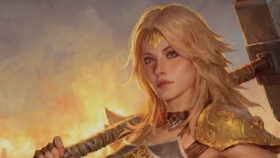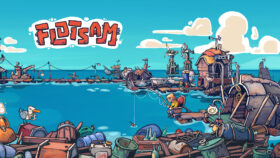Although Tchia masquerades as a Legend of Zelda game, the real strength of this open-world adventure actually lies beyond the fact that it features a Breath of the Wild-style physics sandbox, or Wind Waker-esque sailing. Drawing heavy inspiration from the locales and culture of New Caledonia – a French colonialist Pacific Island territory – the most standout moments in Tchia are the seemingly inconsequential ones, where you can appreciate the locale for its inherent beauty, without any worry of reward.
The ‘Tchia’ of the title is a young girl who begins the game living on a remote island with her father. On her birthday, her father is suddenly abducted by a strange force, and so Tchia sets off on a grand adventure to find out who abducted him, and hopefully get him back.
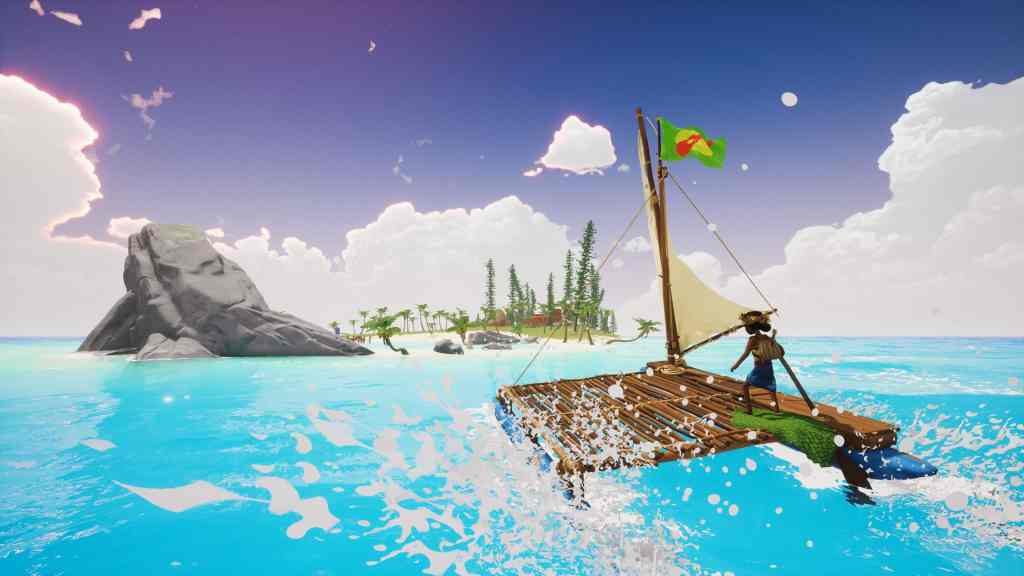
Read: Indigenous games express culture through play
It’s ambitious in scope – the game immediately lets you loose on a vast archipelago, sailing raft in tow, and tasks you to use your own intuition to do the best on the journey ahead. Tchia begins by casually flitting through dozens of tutorial pop-ups, for countless small systems, while at the same time providing you with absolutely no guidance at all. In the game’s opening hour, you begin feeling as lost as the young Tchia would, as she has seemingly never left her island, sailed, or interacted with the outside world before.
What much of the game eventually boils down to is the act of exploring the world, finding collectable items, returning them to quest givers, and then finding what you need next.
This rudimentary flow is something Tchia feels keenly self-aware of. The first major lead to finding the big bad results in the young Tchia coming up against corporate bureaucracy, requiring her to sign endless reams of paperwork in the lobby of a towering monolith, and agree to provide a list of specific items to book an appointment. It’s a jarring invasion of modern capitalism into the natural environs of the locale, both physically and ideologically. Curiously, the game seems to both denounce it (given the clear use of industrial locations as enemy outposts and antagonistic locations) and embrace it at the same time, with the prevalence of claw machines and gold trophies playing their role in building out an enormous dress-up wardrobe for Tchia.
It later becomes clearer that the reliance on collectables are framed as something culturally intrinsic to the identity of Tchia, in the form of a traditional custom to offer local village leaders gifts in exchange for their guidance. To find these items, you need to trek to lookout points at high-altitude locations, reveal local points of interest, and then journey to find the thing you need.
Fixate on this constant string of quests, and Tchia can be a slog. It’s old-fashioned open-world design made more egregious by the long distances you have to travel, how arduous it can be to get there on foot or sea, and lightweight character movement that sometimes lacks the precision needed to confidently balance on precarious structures. Much faster shortcuts present themselves as you explore the world, but they don’t make your desire to travel any more compelling.
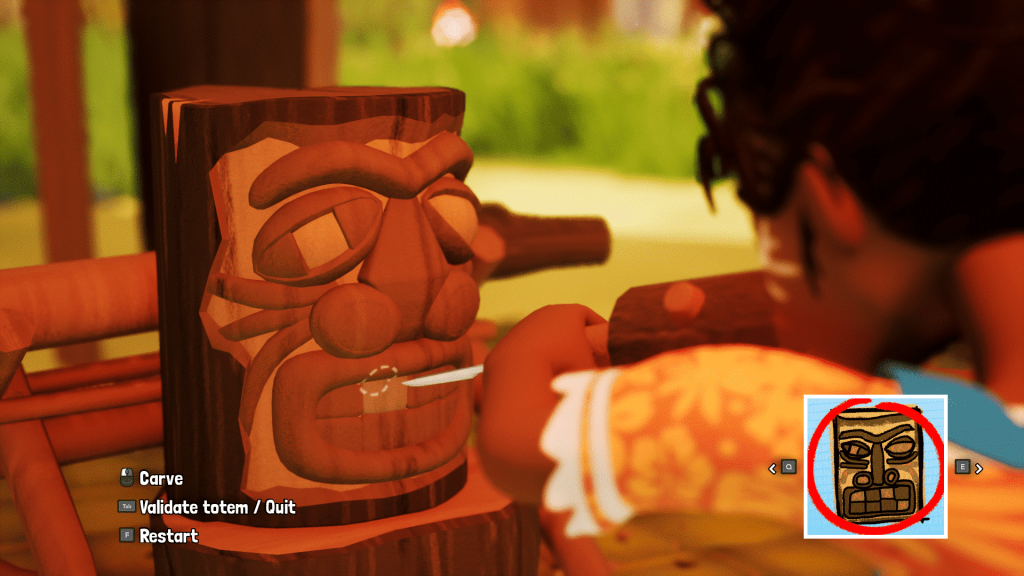
However, focus on the journey itself, and smell the roses with each step you take, and the true joy of Tchia will reveal itself to you. The game appears to be designed to make sure you concentrate on your surroundings, and not a marker on a minimap, by virtue of the fact that there is no minimap.
Tchia makes the very bold move of providing you with only a static map of your surroundings, without explicitly telling you where you are on it (though Tchia can narrow down a general area for you). Finding waypoint markers, collectables, towns, and people requires you to observe your immediate surroundings, attempt to place them on the map, and triangulate your position that way. If you find yourself in the mindframe of wanting to rush towards the next objective, you’ll have a terrible time, as the only way to precisely pinpoint your location is by finding the odd signpost. But if you slow down and take it all in, the sights you see along the way become the main drawcard. It’s a beautiful world.
Outside of the terrain, a lot of those sights are inconsequential in the scope of Tchia as a video game. But as a window into the life of another culture, it’s fascinating. Tchia’s visits to villages are typically accompanied by short, cinematic sequences of everyday life, some of them minigames that you can choose to participate in.

You might sing songs with village folk and play along with Tchia’s ukulele. You might see a performance of traditional dance, and choose to accompany them with percussion. You might help prepare and cook some local cuisine. As someone with no prior knowledge of the region. I’d find myself rushing to every food stall I saw, just to see what kind of dish they served. Together with some pleasant cutscene direction and evocative music, Tchia invokes a Disney-like wonder for the people and places of New Caledonia.
Other sandbox mechanics add an impressive mechanical layer to Tchia’s take on an open-world, even if they do feel glossed over too quickly, and are left for you to explore the limits on. Tchia’s ability to ‘soul jump’ is the most exciting feature, which allows you to inhabit both inanimate objects and launch them, as well as take over the bodies of animals, and use their abilities.
Discovering that you can soul jump into a bird and simply fly across the world at great speeds and heights was an eye-opening revelation, even if it makes the game’s quests far more mundane and trivial. And although the game is light on combat, occasional encounters with the mythical, fire-prone antagonists force you to think creatively with lamps, dynamite, the environment, and your soul jump power.

Taken as a leisurely journey where the goal isn’t the be-all and end-all, Tchia can be a very pleasant getaway into a playground of delightful sights, sounds, and toys to play with. As a series of quests, it can feel ordinary. But as an escape to another place, it can be wondrous.
Three Stars: ★★★
TCHIA
Platforms: PC, PlayStation 4, PlayStation 5
Developer: Awaceb
Publisher: Kepler Interactive
Release Date: 21 March 2023
The PC version of Tchia was provided and played for the purposes of this review.
